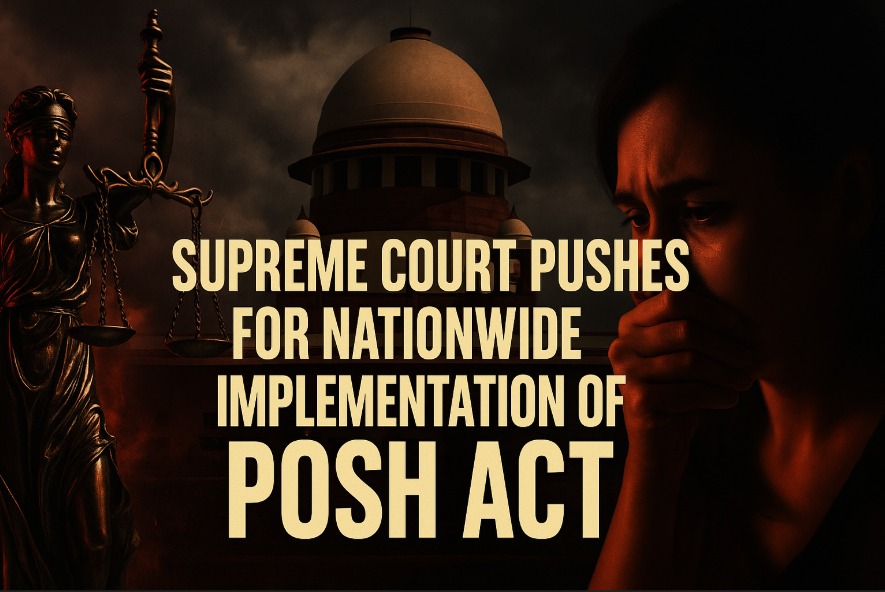A Stern Reminder from the Apex Court
On May 31, 2025, the Supreme Court of India issued a strong caution to all States and Union Territories, pressing them to finally act on the Sexual Harassment of Women at Workplace (Prevention, Prohibition and Redressal) Act, 2013 (POSH Act). This wasn’t the first reminder — but it was certainly the firmest.
More than a decade since the Act came into force, the Court made it clear: ensuring safe workplaces for women is not optional. It’s a legal and moral obligation that every State must take seriously — and from now on, non-compliance will not go unnoticed.A bench led by Justice B.V. Nagarathna and Justice Satish Chandra Sharma directed all States and Union Territories (UTs) to file affidavits confirming their compliance with crucial POSH Act provisions—something that had lingered unfulfilled since their order on December 3, 2024.
The Supreme Court is making it clear that workplace gender safety is no longer a negotiable issue but rather a legally mandated requirement that calls for clear action.
Committees, surveys, and district officers are crucial areas for compliance.
The Supreme Court’s orders focused on three essential POSH Act pillars:
A. Appointments of District Officers
By December 31, 2024, each State had to appoint a District Officer to oversee POSH enforcement. Now, each State and UT has submitted an affidavit confirming compliance. These officials’ names are to be listed on NALSA’s website and the Women and Child Development department portals .
B. Constitution of Local Complaints Committees (LCCs)
District-level LCCs are vital for women in informal sectors, including domestic and rural workforces. The deadline for creating or reorganizing these committees was January 31, 2025.
Although LCCs are in place in the majority of states, there are some exceptions:
- Haryana and Delhi (with hazy updates from Karnal, Nuh, and Jind)
- Jharkhand (two districts are not yet finalized)
- The state of Kerala (Details are not clear.)
These States are required by the Court to submit follow-up affidavits that provide more precise status updates.
C. Forming Internal Committees
Internal committees are necessary in any organization with ten or more employees, including government agencies. The deadline of January 31, 2025, has been substantially met in a number of States and Union Territories, including Chhattisgarh, Gujarat, Kerala, Maharashtra, West Bengal, and Goa. But Bihar, Manipur, and Uttarakhand focused only on government workplaces, leaving gaps in the private sector .
Nodal Officers & Portal Confusion
The appointment of Nodal Officers under Section 6(2) is crucial for POSH compliance and online grievance redressal via the She‑Box portal (run by the Centre). However, ambiguity remains: some States haven’t clarified whether their Nodal Officers report under the POSH Act, She‑Box, or both. This includes Arunachal Pradesh, Haryana, Jharkhand, Madya Pradesh, and West Bengal.
The Supreme Court has asked for transparency on this front in the next round of affidavits.
What Takes Place Next?
The Court has postponed proceedings until August 12, 2025, to make sure that neither State nor UT falls behind. This will give time for:
- Follow-ups by lagging States/UTs with regulators
- Information regarding the appointments of LCC and Nodal Officers
- Verified information is posted on official websites.
To further strengthen judicial oversight, advocate Padma Priya, the court-appointed amicus curiae, has also filed a thorough compliance report.
Why This Is Important Access to Justice: LCCs provide essential access to informal, district-level redressal mechanisms for women working in unorganized sectors.
Legal Responsibility: From Speech to Deeds
The Supreme Court is holding States to the law, not just reminding them to do so. The Court is making it clear that this is no longer just about guidance by imposing strict deadlines, requiring sworn affidavits, and even threatening financial penalties. It has to do with legal accountability. States cannot afford to put off or ignore their obligations to provide safe working conditions for women.
Transparency in Governance
One of the most powerful ways to build trust in the system is through transparency. The Supreme Court is making sure of that by insisting that details of officers and committees responsible for enforcing the POSH Act are easily accessible to the public. When names and contact details are out in the open, it empowers women to seek help — and holds officials accountable.
The next hearing is set for August 12, 2025.
States like Kerala, Jharkhand, Haryana, and Delhi must update the court on pending LCCs and nodal appointments.
Confirmed details on official websites for Nodal Officers, District Officers, and Committee members must be furnished.
Private sector compliance, especially in workplace ICs, must be tracked and reported.
AUTHORED BY
Pragya Jakhar is a second-year Lovely Professional University student pursuing a B.A. LL.B. (Hons.). Human rights and constitutional law particularly interest her. Pragya likes to write about legal subjects and is committed to improving and making the legal system more accessible to all.
Throughout the years, she has written numerous articles that examine important legal issues, and her growing comprehension of the operation of the law, both in books and in practice, allows her to contribute perceptive opinions to academic and policy discussions. She enjoys keeping up with news and significant court decisions.

